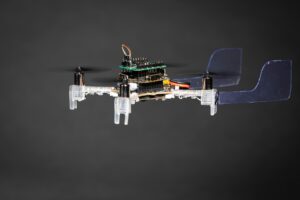Researchers and scientists are interested in developing devices that can sniff the chemicals and navigate in the air to locate disaster survivors such as gas leaks, explosions, etc. But most man-made sensors are not sensitive or fast enough to locate or process-specific smells. In this direction, scientists have developed Smellicopter.
It is an autonomous drone that uses a live antenna from a moth to navigate towards smells. Additionally, it can also sense and avoid obstacles in its way while flying. Researchers have also attached two plastic wings on the back of the drone, to help it fly continuously in the air. Smellicopters mimic how moth searches for smells and do not need any help from the researchers to search for odours. It begins its search by moving towards the left for a specific distance and if nothing passes a specific smell threshold, it moves towards the right for the same distance. Once the odour is detected by the Smellicopter, it changes its flying pattern to reach towards it.
It can also avoid obstacles with the help of four infrared sensors which measures what’s around it 10 times each second. If an obstacle comes within eight inches (20 cms) of the drone, it changes its direction by going to the next stage of its cast-and-surge protocol.

